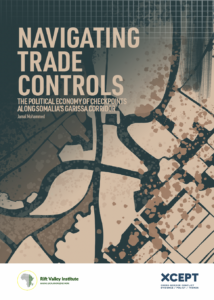THE POLITICAL ECONOMY OF CHECKPOINTS ALONG SOMALIA’S GARISSA CORRIDOR
SUMMARY
• The Garissa corridor is an essential artery for trade and exchange between Kismayo in Somalia’s Jubaland state, and the Kenyan city of Garissa. Checkpoints along this route were originally a militia phenomenon, with each sub-clan operating its own roadblocks.They proliferated during the clan militia period (1990–2006) with checkpoints controlled by warlords from various clans and sub-clans. Since 2007, after the shortlived Islamic Courts Union (ICU) period, al-Shabaab became a key player in the control of checkpoints along the corridor.
• Today, all checkpoints along the corridor are either controlled by al-Shabaab or soldiers representing the Somalia National Army or the Jubaland Security Forces, also known as the Darwish, which control entry and exit points to Kismayo itself. On the Kenyan side of the corridor, several security and customs agencies operate checkpoints.
• Checkpoints are versatile tools of government. Along the Garissa corridor, they serve primarily as revenue collection tools, allowing armed actors to extract wealth from cross-border trade flows. But they are also deployed to project symbolic authority and to deprive opponents of income through discriminatory taxation policies.
• Competing taxation regimes co-exist along the corridor. Transporters pay at each checkpoint under control of government-allied forces, while al-Shabaab only taxes vehicles once, yielding a receipt that gives free passage at subsequent checkpoints it controls. Al-Shabaab nonetheless charges and benefits more: the group generates approximately two million US dollars per month in checkpoint revenues, compared to five hundred thousand US dollars generated by government-controlled checkpoints.
• The presence of competing checkpoint taxation regimes increases transport costs, affecting the overall cost of goods flowing along the route, and ultimately inflating consumer prices. To ease the burden of checkpoints on cross-border trade, transport entrepreneurs may attempt to skirt government checkpoints by taking ‘bush routes’ during the dry season. To smooth their passage through al-Shabaab checkpoints and those put in place by Kenyan authorities, they often use brokers (dilaal) who negotiate
the terms of passage and settle payments remotely.
• Checkpoint taxes weigh comparatively more heavily on agricultural goods and therefore disproportionately affect small-scale traders—typically marginalized groups, including women, vulnerable displaced persons, and people from minority clans.
• There is no evidence to suggest that checkpoint revenues are reciprocated by public goods or services to citizens, whether by al-Shabaab or the Jubaland authorities. In addition, taxes collected from checkpoints are not allocated equitably in the departmental budget allocations within the administration, and the lack of resource sharing by dominant clans entails the marginalization of weak clans in society.
This research paper is a product of the FCDO’s Cross-Border Conflict Evidence, Policy and Trends (XCEPT) programme, funded by UK aid from the UK government. XCEPT brings together leading experts to examine conflict-affected borderlands, how conflicts connect across borders, and the factors that shape violent and peaceful behaviour. The programme carries out research to better understand the causes and impacts of conflict in border areas and their international dimensions. It supports more effective policymaking and development programming and builds the skills of local partners.



